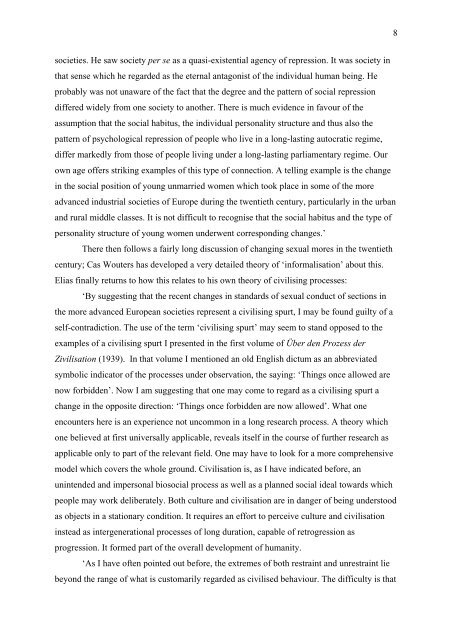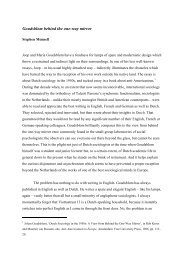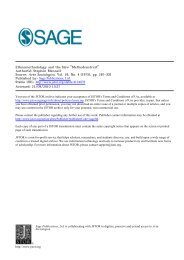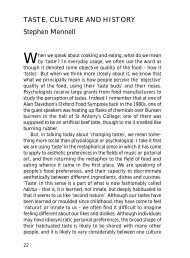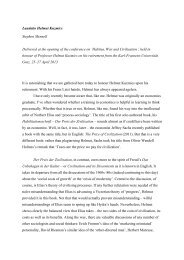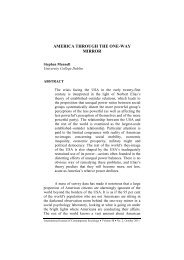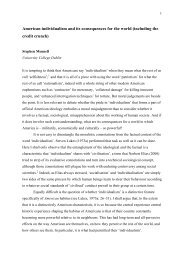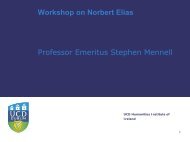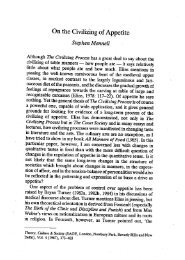paper - Stephen Mennell
paper - Stephen Mennell
paper - Stephen Mennell
Create successful ePaper yourself
Turn your PDF publications into a flip-book with our unique Google optimized e-Paper software.
8<br />
societies. He saw society per se as a quasi-existential agency of repression. It was society in<br />
that sense which he regarded as the eternal antagonist of the individual human being. He<br />
probably was not unaware of the fact that the degree and the pattern of social repression<br />
differed widely from one society to another. There is much evidence in favour of the<br />
assumption that the social habitus, the individual personality structure and thus also the<br />
pattern of psychological repression of people who live in a long-lasting autocratic regime,<br />
differ markedly from those of people living under a long-lasting parliamentary regime. Our<br />
own age offers striking examples of this type of connection. A telling example is the change<br />
in the social position of young unmarried women which took place in some of the more<br />
advanced industrial societies of Europe during the twentieth century, particularly in the urban<br />
and rural middle classes. It is not difficult to recognise that the social habitus and the type of<br />
personality structure of young women underwent corresponding changes.’<br />
There then follows a fairly long discussion of changing sexual mores in the twentieth<br />
century; Cas Wouters has developed a very detailed theory of ‘informalisation’ about this.<br />
Elias finally returns to how this relates to his own theory of civilising processes:<br />
‘By suggesting that the recent changes in standards of sexual conduct of sections in<br />
the more advanced European societies represent a civilising spurt, I may be found guilty of a<br />
self-contradiction. The use of the term ‘civilising spurt’ may seem to stand opposed to the<br />
examples of a civilising spurt I presented in the first volume of Über den Prozess der<br />
Zivilisation (1939). In that volume I mentioned an old English dictum as an abbreviated<br />
symbolic indicator of the processes under observation, the saying: ‘Things once allowed are<br />
now forbidden’. Now I am suggesting that one may come to regard as a civilising spurt a<br />
change in the opposite direction: ‘Things once forbidden are now allowed’. What one<br />
encounters here is an experience not uncommon in a long research process. A theory which<br />
one believed at first universally applicable, reveals itself in the course of further research as<br />
applicable only to part of the relevant field. One may have to look for a more comprehensive<br />
model which covers the whole ground. Civilisation is, as I have indicated before, an<br />
unintended and impersonal biosocial process as well as a planned social ideal towards which<br />
people may work deliberately. Both culture and civilisation are in danger of being understood<br />
as objects in a stationary condition. It requires an effort to perceive culture and civilisation<br />
instead as intergenerational processes of long duration, capable of retrogression as<br />
progression. It formed part of the overall development of humanity.<br />
‘As I have often pointed out before, the extremes of both restraint and unrestraint lie<br />
beyond the range of what is customarily regarded as civilised behaviour. The difficulty is that


